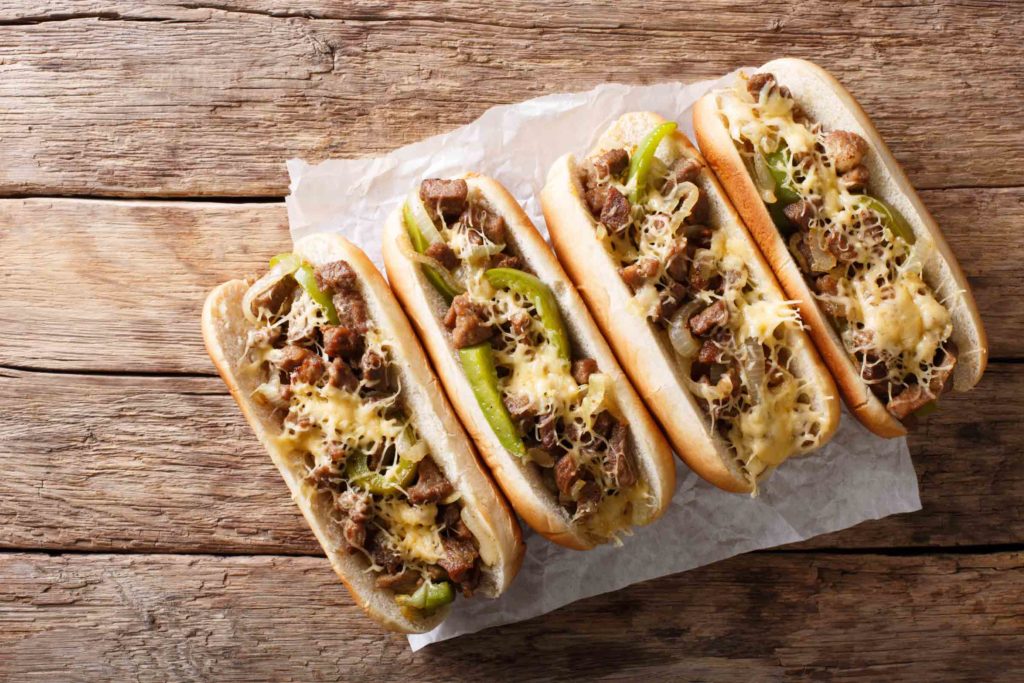The issue of how to tackle food waste in Philly is considered the ‘next frontier’ of recycling in the city, and currently, over 20% of all the waste set out for collection by Philadelphia residents is organic matter. This is not only a cause of immediate concern in terms of pests, with rotting of food left in dumpsters and recycling bins, but an even bigger problem environmentally, with the amount of food waste heading to landfill making an impact locally, nationally, and globally over the long term.
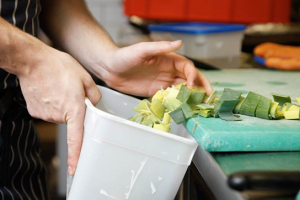 Across the US, people throw away around 40% of all food produced. That adds up to nearly 80 billion lbs of food each year, or 219 lbs per person. For an average family of four, that’s $1,600 worth of food simply thrown in the trash and sent off to landfill. Apart from the economic consequences of this much waste, especially when an estimated 1 in 9 adults in Pennsylvania (and 1 in 7 children) are struggling with hunger, there is the issue of methane production.
Across the US, people throw away around 40% of all food produced. That adds up to nearly 80 billion lbs of food each year, or 219 lbs per person. For an average family of four, that’s $1,600 worth of food simply thrown in the trash and sent off to landfill. Apart from the economic consequences of this much waste, especially when an estimated 1 in 9 adults in Pennsylvania (and 1 in 7 children) are struggling with hunger, there is the issue of methane production.
Organic materials decay in landfill sites where they produce this damaging greenhouse gas that is thought to be 28 times more powerful than carbon dioxide. In addition to this, organic waste in landfills contributes to polluted groundwater which can affect local water cycles and contaminate drinking water. With these issues combined, it’s clear the question of how to deal with food waste in Philly is one that needs to be addressed.
What is the city doing? And what can you do as an individual or business owner to reduce the amount of food waste that ends up in landfill? Here, we explore how the City of Philadelphia is helping residents and local businesses tackle food waste across the county and in the state of Pennsylvania.
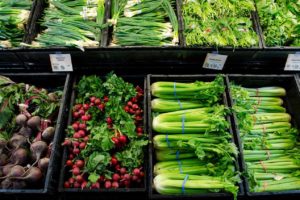
Source: nrdc.org
Dealing with food waste in Philadelphia
In 2016, Philadelphia Mayor Jim Kenney signed an Executive Order that brought together 16 experts from across the city to develop a zero waste action plan. The panel was made up of individuals from city agencies, the business community, and non-profit organizations, with the aim of engaging residents, businesses, institutions, and city departments in better waste reduction practices that would divert food and organics away from landfill.
This Executive Order was seen by many as the first step towards a longer-term zero waste goal that would eliminate the use of landfills and conventional incinerators by 2035. At the time, it was recognized as an ambitious target for a city that, according to the City of Philadelphia Streets Department, generated nearly 2.5 million tons of waste in 2014 alone.
Today, around 40% of commercial and residential waste is recycled. This is a step in the right direction when compared to a national average of around 32% but lags behind cities such as San Francisco, which recycles around 80% of all waste.
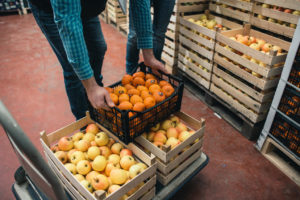
Source: nrdc.org
Philadelphia’s zero-waste initiatives currently include:
- Municipal building waste audit program
- Zero-waste partnership program
- Community composting network and other food waste diversion programs
- Joining the C40 Thriving Cities Initiative
- Participating in National Resources Defense Council (NRDC) Food Matters Regional Initiative
- Supporting zero-waste policies and financial incentives, including a ban on plastic bags and tax credits for sustainable businesses
Food waste is a major component of the city’s recycling policy, and for good reason, as the city’s current level of provision for managing food waste falls a long way short of what is required. However, with technical assistance from the NRDC tying Philly to its Food Matters Project, and the introduction of innovative pilot strategies to deal with food waste in the local area, the city has received a much-needed shot in the arm to implement workable food waste solutions.
Additionally, there is also funding in place from the US Department of Agriculture’s Community and Food Waste Reduction Projects. This particular project aims to tackle food waste and relieve community food insecurity by promoting food waste recycling programs and composting, reducing the amount of waste created across the municipality while simultaneously reducing the demand for citywide garbage disposal services.
But what does this mean in practice for Philly residents and businesses?
The best way to recycle food waste in Philly? Cut back and donate.
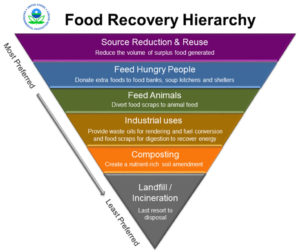
Source: nrdc.org/
In line with the EPA’s Food Recovery Hierarchy, the primary goal of reducing food waste is to scale back surplus food production at the source. This means improving harvesting and distribution at the production level, but also buying less unnecessary food at the consumer level. More effective meal planning and prepping, correct storage, and eating everything you buy is the most effective way of reducing food waste for both residents and businesses.
Following close behind reduction is donation, providing the opportunity to feed hungry people and divert an estimated 68% of food waste that is still edible to people who are food insecure. In Philly, this can be done through food bank programs, such as Philabundance and Foodpantries, or by consulting this map of local food banks in the city. Always check with your local pantry that they are open and able to accept your donation as they are often voluntary organizations and sometimes unable to deal with larger quantities of food.
There are also active Buy Nothing networks across the city where you can “share” unwanted food and other items. These are hyperlocal networks, often run through social media groups, where people can trade or donate excess food to other participants, generally within walking distance.
What to do with leftover food waste in Philadelphia
Not all food waste is suitable for donation, so how can residents and businesses recycle food waste that is no longer edible? The answer lies in composting.
 Until recently, a major stumbling block to citywide composting was that the state did not have a permit for the practice in high-density urban areas. Having secured the city’s first permit, in conjunction with the Pennsylvania Department of Environmental Protection, there are plans for a first urban compost pile at 5650 Rising Sun Avenue. To begin, this will mostly deal with yard waste, such as grass clippings and other organic materials from Philly gardens, but according to the phila.gov webite, these facilities will be expanded to cater to all types of food waste.
Until recently, a major stumbling block to citywide composting was that the state did not have a permit for the practice in high-density urban areas. Having secured the city’s first permit, in conjunction with the Pennsylvania Department of Environmental Protection, there are plans for a first urban compost pile at 5650 Rising Sun Avenue. To begin, this will mostly deal with yard waste, such as grass clippings and other organic materials from Philly gardens, but according to the phila.gov webite, these facilities will be expanded to cater to all types of food waste.
Eventually, the city’s first Community Compost Network will develop 20 to 25 sites across the city, modeled on a similar and highly successful program in Washington DC. These will be city-owned, urban agriculture, community garden, or recreation sites where community food composting systems will be installed. The goal is to engage with residents and encourage community composting with an emphasis on the importance of reducing food waste.
To meet the city’s aspirational zero-waste goal, curbside collection must also be implemented, with haulers collecting food waste and taking it directly to suitable composting facilities. To do this, Philadelphia needs to expand the capacity of its Fairmount Park and Water Department compost plants. Investment is also required to create other large-scale facilities that can deal with this kind of level of recycling, especially with the 2035 Zero Waste goals in mind.
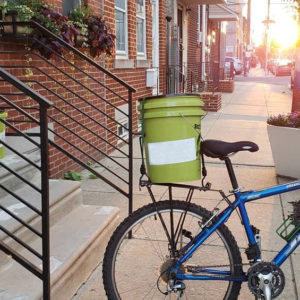
Source: instagram.com
Current composting options – Where to recycle food waste in Philly
The Community Compost Network program and the possibility of future curbside collections are positive signs for the city. But what can residents and businesses do now to recycle their food scraps? Currently, options are limited, however, there are still ways to compost.
There is a composting site at:
- Fairmount Park Organic Recycling Center
3850 Ford Rd, Philadelphia, PA 19131
Like most Sanitation Convenience Centers in Philly, this facility is currently mostly geared towards compostable garden waste and is not able to accept commercial food waste, meaning the city still has plenty of work to do to meet its own deadlines and increase capacity to deal with food waste at both a domestic and commercial level. Renewable energy plants, such as the South Philly refinery are still in the pipeline, however, waste-to-energy remains a contentious issue for true zero-waste adherents.
In addition to this, there are small-scale private compost collection businesses that charge a fee for their service. Circle Compost is one example, and there are other services such as this that will collect food waste for drop-off at composting facilities. These services, in addition to composting at home in a garden bin if you have the available space, are small steps towards the city’s zero-waste goals that you can take today.
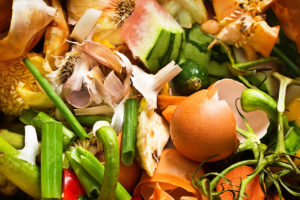
Source: nrdc.org
What does Philadelphia need to do to combat food waste?
Funding from organizations such as the NRDC and participation in projects like Food Matters are a good start, however, it’s widely recognized that both the Philadelphia Streets Department and the Office of Sustainability need to do more. This includes working with other departments such as the Food Policy Advisory Council to create a more just and sustainable food system across the city and its respective municipalities.
In addition to this, support from the NRDC may provide much-needed technical assistance to help Philadelphia develop strategies to meet its sustainability targets. For the time being, residents and businesses especially need to take the question of how to manage food waste in Philly into their own hands.
For larger businesses, commercial waste management services can help you divert food waste away from landfill while also allowing the monitoring of your waste generation and disposal. Here at RTS we are committed to providing reliable, transparent, and sustainable services that allow your business to work towards furthering your sustainability goals.
For more information on how your business can reduce food waste, or optimize your existing waste management operations, contact our TRUE advisors today. Additionally, subscribe to the RTS blog for more information on sustainable materials, waste reduction, and recycling.

